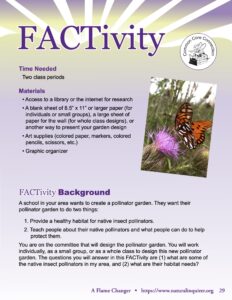FACTivity – A Flame Changer

SHARE
A school in your area wants to create a pollinator garden. They want their pollinator garden to do two things:
1. Provide a healthy habitat for native insect pollinators.
2. Teach people about their native pollinators and what people can do to help protect them.
You are on the committee that will design the pollinator garden. You will work individually, as a small group, or as a whole class to design this new pollinator garden.
The questions you will answer in this FACTivity are (1) what are some of the native insect pollinators in my area, and (2) what are their habitat needs?
Materials:
- Access to a library or the internet for research
- A blank sheet of 8.5" x 11" paper (or larger) to draw your proposed garden
- Art supplies (colored pencils, markers, scissors, etc.)
- Graphic organizer (included)

Part Of
A Flame Changer - How Fire Diversity Affects Bee and Butterfly Populations
Explore Full Article
SHARE
Standards addressed in this Activity:
Next Generation Science Standards
The Next Generation Science Standards (NGSS) are a set of K-12 science education standards emphasizing inquiry-based learning, real-world applications, and integrating engineering practices, aiming to deepen understanding of science while promoting critical thinking and problem-solving skills.
- HS-LS2-7Design, evaluate, and refine a solution for reducing the impacts of human activities on the environment and biodiversity.
- HS-LS4-6Create or revise a simulation to test a solution to mitigate adverse impacts of human activity on biodiversity.
- MS-ESS3-3Apply scientific principles to design a method for monitoring and minimizing a human impact on the environment.
- MS-ETS1-2Evaluate competing design solutions using a systematic process to determine how well they meet the criteria and constraints of the problem.
- MS-LS2-1Analyze and interpret data to provide evidence for the effects of resource availability on organisms and populations of organisms in an ecosystem.
- MS-LS2-4Construct an argument supported by empirical evidence that changes to physical or biological components of an ecosystem affect populations.
- MS-LS2-5Evaluate competing design solutions for maintaining biodiversity and ecosystem services.
Social Studies Standards
Social Studies Standards are educational guidelines outlining the essential knowledge, skills, and concepts students should learn in subjects such as history, geography, civics, and economics, aiming to provide a comprehensive understanding of societal structures, historical events, and global perspectives.
- Civic Ideals and Practices
- People, Places, and Environments
- Science, Technology, and Society



